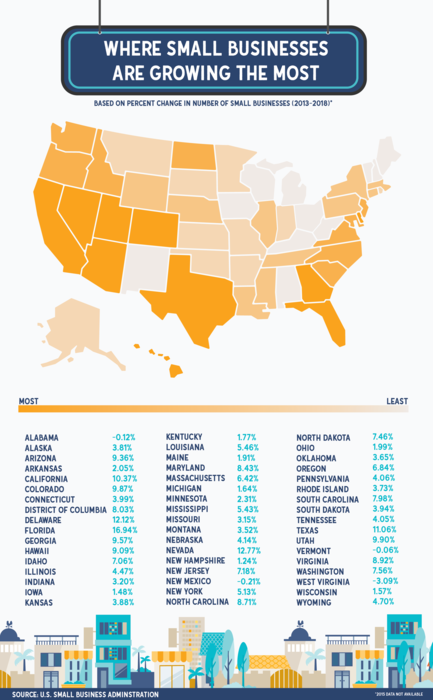
Home to one of the biggest economies in the United States, Florida’s small business scene has never been in better shape. The state is famous for its tourism and agriculture, but the creation of new small businesses in all industries & niches has reached an all-time high.
In fact, communications experts – Moneypenny recently named Florida as the country’s “most entrepreneurial state”. Having commissioned a study to examine the growth of small businesses in each state between the years 2013 – 2018, Moneypenny’s research showed Florida experienced the greatest increase in small business growth; with a 17% increase.
Interestingly, Nevada came in second with a 13% increase and the District of Columbia experienced the third biggest rise with an 8% increase. West Virginia was the ‘least entrepreneurial’ with a 3.09% decrease in the number of small businesses
Why Run Your Business From Home?

Working from home can also be a lot more comfortable; with many office arguments based on seemingly trivial things such as the temperature, you have complete control over the environment in your home office.
Thanks in part to the installation & adoption of high-speed internet; the ability to work from home, reduced a major barrier to entry by enabling people to start their own business without having to raise funds & investment.
If you are self-employed, you can avoid a major start-up cost and overhead if you are able to work from home – office rental. In 2018, office rental costs in South Florida increased from $31 per foot in 2017 to $32.87
Home Business Tools
If you decide to run your own business from home, then be sure to take advantage of many of the tools & tricks available. Employing a virtual receptionist that can filter our unwanted sales calls and other unwanted interruptions – allowing you to focus on the work you have at hand. With a higher quality answering service, you can also benefit from having your own dedicated receptionist, who will know your business well enough to appear to all callers like an in-house, full-time hire.
Outsourcing, in general, can be a great way to cut costs. With outsourcing, you tend to employ people per project rather than on a permanent basis. Websites such as Upwork and PeoplePerHour are great for high skilled projects including web development and online marketing, whereas virtual assistant websites such as Ovavirtual are great for hiring assistants who can perform data entry tasks, filter out unwanted emails and book train tickets, etc.
Another way to appear more professional and trustworthy is to purchase a virtual address. By having a virtual address you can give the impression that you have a high street ‘bricks and mortar’ presence that will reassure potential clients and customers.
Remote Working Tips
Creating a mental and possibly a physical barrier between work and family life can be key to making the process successful. For example, if you have the room, make sure that you have a specific place to work from in the house and at the end of each working day – it is recommended that you go out and take a walk around the block. This can help create a mental barrier between work and family time, as you set the intention to switch off from work as you come back through the door after your walk.
Consider working a few days a week at the local library, the coffee shop, a fellow entrepreneur’s house or even family members’ spare room. You could even set up an office in your car if space allows it.
As with any business, you should ensure that you have a business plan before you embark on your venture. Be sure to include your Unique Selling Point (USP) and identify your target market. Make sure to register your business and determine your business licensing and tax obligations.












